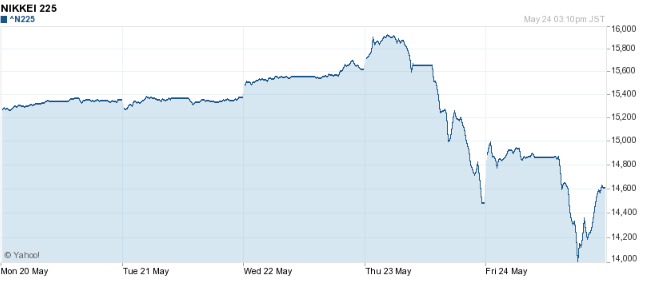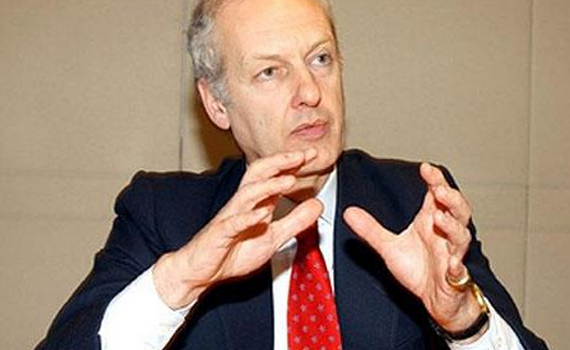The great wildebeest migration through the plains of Africa is one of the natural wonders of the world. More than two million animals join together and flee from the Serengeti to the Maasai Mara Reserve .

In nature, there are many examples of herd behaviour: birds flying south for the winter, fish swimming in schools, sheep flocking.
Herd behaviour also occurs in humans – riots, crowds at football matches, religious gatherings. This week we saw a perfect example in financial markets.
On Thursday, the Nikkei fell 7.3% in one day – the eleventh largest fall in the more than sixty year history. After a massive rally which saw the Nikkei almost double in only six months, many Japanese investors decided to flee all on the same day. The FTSE100 fell almost 3% and the Dow Jones fell almost 2% from the markets peak on Wednesday to the lows on Thursday. Global markets sold off together. The herd mentality drove equities worldwide lower. Why?

Writers of market reports must find reasons to explain why stocks have moved up or down. They blamed this week’s fall on the possible end of the Fed’s QE generosity, weak data from China and some disappointment in the Bank of Japan’s failure to combat rising bond yields.
One of the first rules of statistics is that correlation is not causality. Just because two things happen together, does not mean that one causes the other. The bulls ignored many bad data days in the recent rally. And data from China is always regarded with suspicion anyway. The Financial Times on Friday summarised it well “Explanations abound but everyone was just waiting for an excuse to sell”. However more interesting to me is why investors behave in this herd fashion, stampeding for the exit together.
One of the reasons animals tend to herd is to protect themselves from predators. The seminal research was in 1970: “Geometry For The Selfish Herd,” by W. D. Hamilton.
His theory was that each individual moves into the group to reduce the danger of being preyed upon. This research kickstarted much more on herd behavior and its importance to both individual and group survival.
It is no surprise that there is also much academic research into herd behavior in financial markets given how often it seems to occur. Moreover the predator prey relationship seems a highly appropriate for behavior of financial market participants – one individual’s loss is often another’s gain. Hence the expression “I’m eating your lunch.”
In such a Darwinian Survival of the Fittest environment, it should be no surprise that the majority exhibit herd behavior. Clearly market participants are not running for their lives although for anyone holding a big losing position it can feel like it. There is no easier place to lose wealth rapidly than in financial markets if you don’t know what you are doing, if you’re the weak, the “prey”. And of course in any food system, prey outnumber the predators who are always a small minority.
There are also good reasons investors and traders herd together and flee for the exit at the same time, like we saw this week. Many fund managers are rewarded according to how well they do relative to a benchmark index. If the index falls significantly and the fund manager doesn’t sell, then the fund’s relative performance will suffer. And a poorly performing fund of course, affects the fund manager’s own compensation and career prospects. It is the same in a rising market, professional fund managers are scared into buying for no other reason than the market is going up. But this explains how a sell off, for example, gains momentum, but how does it begin? Well this academics have termed an “information cascade”. Some investors decide to sell, and then prices will fall. The price fall is then the new information that persuades other investors to follow the first group. The key is that the early minority drives the sell decision of the majority. Hence a “cascade” develops.
So there are reasons why humans exhibit herding behaviour. And yet in the choice between predator and prey, surely it is better to be eating and not the eaten (lunch or any other meal). In financial markets, it is those that are not part of the herd that tend to make money. I am not sure they want to be likened as such, but maybe these are the few predators.
I had the luck to cover the legendary Fidelity Fund Manager Anthony Bolton when I was at Goldman Sachs. Over 25 years he delivered a market beating 20% average yearly return from his Special Situations fund. His whole ethos of investing was to ignore the consensus, to step away from the herd. His book is entitled “Investing against the Tide” and it explains his contrarian approach. Many of the very few great investors consistently defy consensus. To quote Peter Lynch “Everyone has the brain power to make money in stocks. Not everyone has the stomach. If you are susceptible to selling everything in a panic, you ought to avoid stocks and mutual funds altogether.”

Anthony Bolton
In the midst of the great TMT dot com boom, Warren Buffett famously refused to get involved. And yet retail investors were crying out for funds investing in these stocks. Consequently many fund management groups were more than happy to launch TMT funds which subsequently blew up and lost their investors a lot of cash. The same with financial funds – in the glory credit boom days there were again plenty of such specialist funds, many of which again proved disastrous for their investor’s financial health. These are all great examples of herd behaviour, following the latest investment trend or fashion.
And even for short term trading, betting against consensus can be highly lucrative. A forex trader friend of mine consistently uses a trading strategy based on going against the herd. Knowing where the majority will place their stops and trading against their emotional pain.
Herding behaviour is not a surprise – humans are intrinsically wired to conform. The primary angst of most school age children is the fear of being different. That may abate as we get older, but any analysis of adult group behaviour, especially in organisations, shows the instinct persists. People tend to act like the people around them. When I look at my Twitter feed, it is highly fashionable to be hugely bearish and critical on the Eurozone. There is comfort in conformity, contentment in consensus.
But in financial markets, the consensus is not where the real money is made. It is the players that act against the herd that make the money. It’s not education and brains that make a great investor or trader, its attitude – those few who are comfortable without the safety net of conformity.



